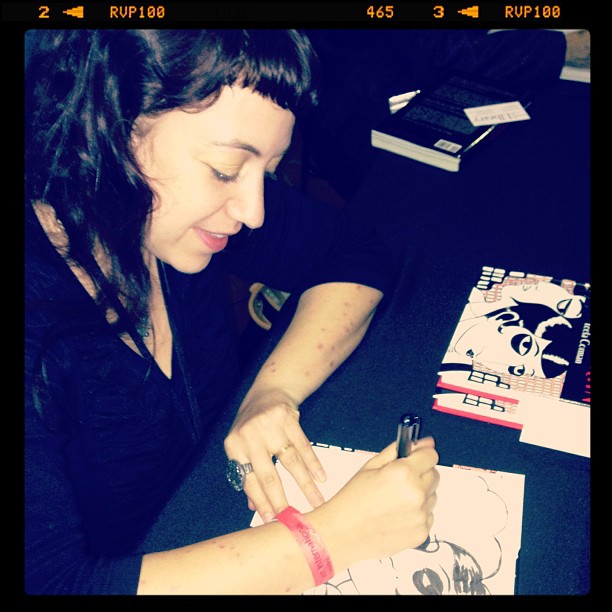By Theresa Diffendal, Staff Writer
Comic artist Leela Corman visited Bryn Mawr on Thursday, Feb. 2, to give a talk on her comics, which address her own and her family’s experiences with PTSD, dealing with intense grief, and being Jewish in modern America.
Corman was introduced to comics at the age of 13. She listed several which sparked her passion for comics and influenced her own work. Two of these were “Love and Rockets” by the Hernandez Brothers and “Persepolis” by Marjane Satrapi.
Corman attended Massachusetts College of Art but disliked it, saying art school was too “ephemeral. They didn’t teach you how to make things with your hands.” She realized that her comics needed to generate a source of income, and began her career by self-publishing three issues of her minicomic, “Flimflam,” while still in college.
For Corman, comics were unlike any other medium. While in the fine arts there is an “emphasis on personality rather than actual content,” comics are a “democratic art form. Anyone who has $2 can buy a copy of my comic … I like that it was so accessible to people.” While her passion for her work is clear, Corman was quick to note that comics were the “most difficult art form I’ve ever attempted.”
The inspiration for most of her work is largely personal. Corman said comics are a way for her to share and process her experiences. By “working with narrative in a different way” than illustrating or painting, she found a way to talk about “my family and their unspoken trauma and my mother’s early immigration to this country.”
Current events have caused her to take the comparisons even further. “Others’ trauma is becoming unavoidable,” she said, while explaining that she couldn’t hear about the refugee crisis without thinking about her own family. Her short piece “The Book of the Dead” dealt with displacement and ways in which traumatized adults and children don’t or can’t communicate with one another.
While “Yahrzeit” was the first piece in which she tried to address personal and family drama, her most “therapeutic” piece was her story about PTSD. The piece, entitled “PTSD: The Wound That Never Heals,” was published by Nautilus, a magazine which strives to entwine science with personal narratives.
The piece focused on the sudden loss of her first daughter and how she continues to suffer. But writing the piece was like “exposure therapy” for her, a method in which those who suffer from mental illnesses are exposed to their fears in safe settings. This technique gives individuals the opportunity to work through their anxiety and distress. For Corman, writing the comic “completely reshaped the way my brain handles triggers.”
Perhaps in response to the graphic and honest nature of some of her work, one attendee asked Corman if she ever tries to censor herself and how she deals with criticism. She responded that she has seen “artists try really hard to control how their art is recepted,” but in her opinion it’s not “conductive” to creativity. “It’s not up to me how somebody else interprets it,” she said. “We’re free to disagree; if you don’t like my comics you don’t have to read them.”
Towards the end, one individual expressed their appreciation for the inclusivity and diversity in Corman’s comics, as they rarely felt represented in media. Visibly touched, Corman replied “I know what it’s like to not see yourself, and it’s so powerful to see yourself represented.”
